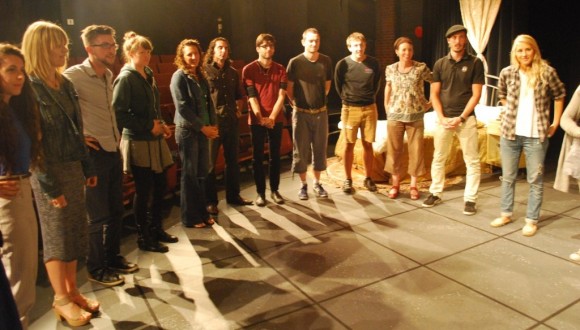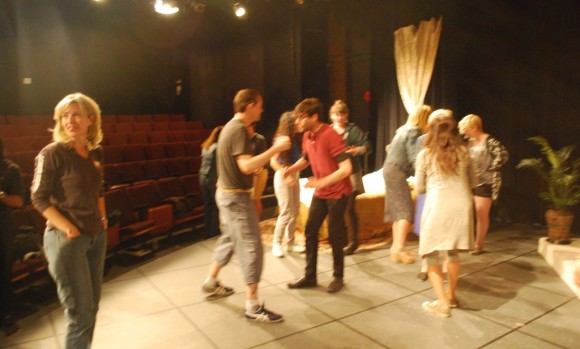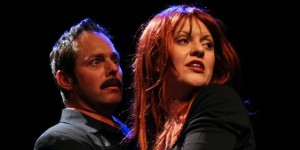SOAP-A-THON: Inside the Improvisers Studio
Posted on September 11, 2013 By Mike Ross Comedy, Entertainment, Front Slider, Theatre
 When Die-Nasty workshop leader Patti Stiles asked if there was anybody who had never improvised, I was the only one who raised my hand.
When Die-Nasty workshop leader Patti Stiles asked if there was anybody who had never improvised, I was the only one who raised my hand.
Everyone else applauded! Some 30 actors, many of them professional, gathered on the Varscona Theatre stage Tuesday night for the first of two preparatory “workshops” leading into this weekend’s 21st annual Die-Nasty Soap-a-thon. It runs continuously from 7 pm Friday to 9 pm Sunday.
All “guests” must attend a workshop, because while a number of top improvisers may be going the entire 50 hours – names familiar to the local theatre scene like Jeff Haslam or Stephanie Wolfe, among special guests from abroad – they need help. They need fresh characters to fall in love with or murder or whatever, they need inspiration from someone who hasn’t been awake for 30 hours straight to help keep the story going. That’s the Holy Grail here: “Serving the story.” The director can only control so much. Every little thing that gets made up on the spot – by anyone – becomes a permanent part of the narrative.

Improv coach Patti Stiles, left, leads a workshop
There are plenty of eager volunteers for this year’s edition: A soap opera within a soap opera. I show up to “pretend” to be a guest who knows how to pretend professionally. How hard could it be?
Stiles reminds us, “Everything is an offer, everything is potential, everything is a possibility. Commit to everything. It makes things way more fun.”
Dana Andersen, another of Die-Nasty’s founders, adds, “Accidents are gifts more than mistakes. It’s like jazz. If you do it more than once it just becomes part of the scene.”
Stiles says, “If you fuck up, enjoy the fucking up.”
The first acting game is called “Columbian Headfuck” and I realize this is probably a PG-13 sort of show. We’re told to pair off, count to three and utter a random word at the same time, and then simultaneously free associate words we just heard in rapid succession. I cratered after “balloon” and “banana.” It does hurt the head.
The next exercise is “Emotional Timebomb,” where one partner registers emotion while the other tries to justify it. I’m paired this time with real actor Tom Edwards, another Die-Nasty veteran, who was said to be grumpy because he locked his keys in his car and doesn’t seem too thrilled about workshopping the stuff he already knows with a newbie. After awkward stammering, I get as far as miming a tinfoil hat for him to wear when I bail out.
Enough of that. These enthusiastic actors are going for it with such intensity, creating a din of complete nonsense, laughing, crying, screaming, moaning, using their whole bodies. It’s as if they’re playing dodgeball, which in a way, they are.
Improv is harder than it looks.

Jeff Haslam, left, and Stephanie Wolfe
There is an aura of reverence and ritual to the Soap-a-Thon. There is talk of a “love circle” before the show begins. Asked why they put themselves through such an ordeal every year, Andersen replies, “It’s a pilgrimage.” Others call it a “vision quest” and speak of strange things that occur in the “wonky hours,” events that stick with the performers for years. Andersen and Stiles played a married couple a couple of years ago, and it still seems strangely real to them. To demonstrate, she screams at him, “You bastard! You broke my heart for 35 hours!”
These guys take their silliness very seriously. People still can’t believe it’s an entire world created out of thin air, a complete longform story with the same goals as any great theatre: “It’s about people being changed and affected,” Stile says, though it’s Soap-a-thon participants themselves who seem the most changed and affected.
There are rules, let’s call them “guidelines.” Don’t eat all the catering, don’t smash props, don’t kill a beloved character, don’t pick a name that’s hard to remember, practice basic hygiene, don’t steal someone’s costumes, always say yes to everything, and when in doubt, “change emotions – the audience will think something dramatic is going on.”
Stiles says, “The greatest gift of an improviser is being able to inspire their partner’s imagination.”
A couple of women with foreign accents were in the audience watching Tuesday’s workshop. One asked innocently, “Do you have a story that you already know?”
Stiles says, “Nope!”
“What about characters?”
“Not yet.”
“Oh, wow.”
Couldn’t have summed it up better.













